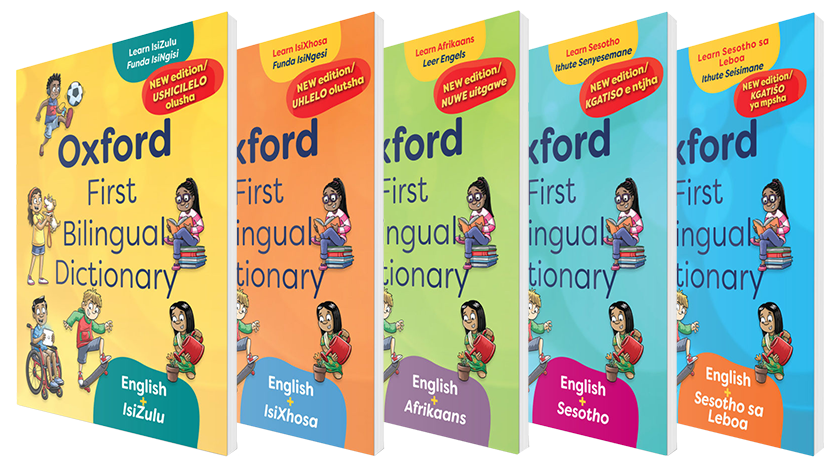2023 has seen the launch of year two of AVBOB’s Road to Literacy campaign, in partnership with Oxford University Press South Africa. The campaign aims to contribute to improving literacy (reading) skills in children across the country by awarding underprivileged primary schools and education Non-Profit Organisations (NPOs) a trolley library equipped with 500 books to the value of R50 000.
Last year, 180 deserving schools and NPOs each received a trolley library. This year, the goal is to deliver 260 trolley libraries, with OUPSA focusing on the role of mother tongue learning in achieving literacy.
Mother tongue learning
Research supports mother tongue learning as far as possible. Various studies have found that teaching in a mother tongue helps to reduce dropout rates, fosters independent learning, instils confidence in communication, and makes education more accessible to learners.
According to the Language in Education Policy, South African learners’ Home Language should be used as their Language of Learning and Teaching whenever possible. This is especially important in Grades 1-3, when the foundations for literacy and numeracy are laid. However, many learners whose Home Language is not English then experience great challenges in transitioning to English in Grade 4 as required by the Department of Basic Education.
Supported by mother tongue learning, the Action Plan to 2024: Towards the Realisation of Schooling 2030 envisages that by 2030, “improved education … will lead to higher employment and earnings, while more rapid economic growth will broaden opportunities for all and generate the resources required to improve education”.
Progress was checked via the via the Early Grade Reading Assessment in Grades 1 to 3 and the School Monitoring Survey in Grades 6 and 12. However, the report showed that, in spite of numerous interventions and strategies, South Africa “is not on the correct trajectory to meet the goals set for 2030”.
One way to help tackle the literacy challenge is to empower learners to help themselves by giving them access to a dictionary. Not just any dictionary, though – selecting the right fit is crucial. Factors to consider include age-appropriateness, language level, local content, grammar support, pointers for developing dictionary skills, and choosing between a monolingual (one language) and bilingual (two languages) dictionary.

Mono- versus bilingual dictionaries – which is better?
A popular misconception is that monolingual dictionaries are preferable or “superior” to their bilingual counterparts. Though monolingual dictionaries are perfect for further developing existing language skills, research has shown that bilingual dictionaries are best when it comes to acquiring an additional language.
The reasons include allowing code-switching in the classroom and empowering learners to learn independently. Apart from translation techniques forming part of most learners’ learning strategies, bilingual dictionaries also enable learners to check comprehension and sense, decode instructions, and explain difficult words or concepts.
A small-scale study OUPSA carried out in Gqeberha into teachers’ perceptions of the impact of the Oxford Bilingual School Dictionary: isiXhosa and English showed that the impact was felt in the Home Language (isiXhosa) as well as the Additional Language (English). Learners were not only more confident reading and pronouncing English, but their isiXhosa vocabulary had also grown, and they learnt more quickly.
Specialist dictionaries for SA learners
The second year of the Road to LiteracyTM campaign coincides with the completion of Oxford’s series of ‘Big 5’ African languages with the publication of the Oxford Bilingual School Dictionary: Sesotho and English. (The others are isiZulu, isiXhosa, Sesotho sa Leboa and Setswana.)
These bilingual school dictionaries have been made with the South African classroom in mind. Words are selected scientifically by analysing the curriculum and the words learners need to know to succeed. With African languages, especially the agglutinative languages such as isiZulu (where parts are added to root words to form different parts of speech etc.), many learners find it confusing when they have to look up words as they are used in natural language. The Oxford Bilingual School Dictionary series addresses this problem by using whole words as headwords, not only the root.
The dictionaries also include words unique to South Africa, noun classes, definitions and/or example sentences, cross-references, usage notes, idiomatic expressions, annotated illustrations for word-building, grammar support, pronunciation guides, and activities to entrench dictionary skills.

Reading for meaning – achieving true literacy
According to the Progress in International Reading Literacy Study (PIRLS) of 2021, 81% of Grade 4 learners in South Africa cannot read for meaning – in other words, are technically illiterate. This percentage is up from 78% in the previous PIRLS (2016), reflecting the effect of lengthy Covid lockdowns on the existing reading crisis.
This has far-reaching repercussions for academic achievement across all subjects and grades: If you can’t assign meaning to texts, you simply cannot read, write or learn. In addition, in Grade 4 the majority of South African learner’s transition from learning in their Home Language to learning in English. Bilingual dictionaries are key to supporting this transition.
This support extends beyond the translation, meaning and spelling of words. Research shows that dictionaries are used extensively to check grammar, pronunciation and register, as well as the correct usage of words in sentences, phrases and fixed expressions.
After the 2016 PIRLS results, President Cyril Ramaphosa escalated reading literacy as a national prerogative, stating that every child should be able to read for meaning by the age of 10. The Road to LiteracyTM campaign is designed to help make that dream a reality. And choosing the right dictionary to support your child will give them wings on their journey.
#Roadtoliteracy #PIRLS #Literacy #Langauage #Dictionaries



